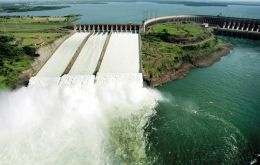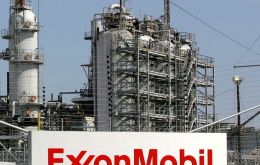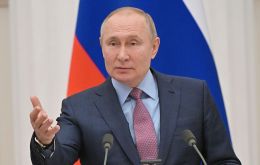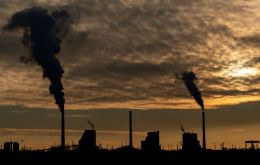MercoPress. South Atlantic News Agency
Energy & Oil
-
Monday, January 16th 2023 - 19:29 UTC
Argentina has most bizarre regulations, leading businessman tells Harvard

Francesco Starace, CEO of Italy's Enel, the company owning a majority of Buenos Aires electricity suppliers Edesur, said last week during a convention at the Harvard Business School, that they would be leaving the South American country because it “has the most bizarre regulation in the world.”
-
Monday, January 16th 2023 - 19:21 UTC
Opening of Itaipu floodgates might relieve Paraná River downspout

The opening of the floodgates at the Itaipú dam during the weekend is expected to bring some relief to the people along the Paraná river shores after 2023 also started with a downspout, although not quite as severe as in previous years.
-
Wednesday, January 4th 2023 - 21:45 UTC
Chevron activities picking up pace in Venezuela

The first shipment of Venezuelan crude oil to a US refinery in quite a while is about to set sail, it was reported in Caracas. Oil producer Chevron is to send the oil to its Pascagoula, Mississippi, refinery after obtaining a US license in 2022.
-
Tuesday, January 3rd 2023 - 10:55 UTC
Lula's first day if office, meeting Latin American leaders and a selloff in Petrobras shares

As the Brazilian president Lula da Silva settled in his first day in office in the Planalto Palace, Latin American leaders met with the inaugurated president, who faced his first financial challenge, stocks had fallen more than 3%, led by a selloff of shares in state-run oil company Petrobras.
-
Tuesday, January 3rd 2023 - 09:39 UTC
Number of Covid-19 cases on the rise in Uruguay

Uruguayan health authorities Monday announced the country had detected over 8,900 cases of Covid-19 last week for a total of 1,020,161 confirmed infections since the onset of the pandemic.
-
Monday, January 2nd 2023 - 09:40 UTC
Buenos Aires residents welcome New Year in the dark

Thousands of residents in the Autonomous City of Buenos Aires saw the New Year's celebrations brought to an abrupt end when a power cut hit several neighborhoods in the Argentine capital between around 0.30 and 2 am on Jan. 1.
-
Friday, December 30th 2022 - 09:36 UTC
YPF to build lithium batteries in Catamarca

Argentina's state-run Y-TEC YPF plans to install a lithium battery manufacturing plant in the province of Catamarca, according to a deal signed this week between Governor Raúl Jalil and YPF's President Pablo González, it was announced. Also signing the document was Y-TEC (YPF's technological institute) Chief Roberto Salvarezza.
-
Friday, December 30th 2022 - 09:25 UTC
Exxon Mobil suing EU windfall tax on oil companies profits:“counter -productive”

Exxon Mobil Corp is suing the European Union on the grounds that the windfall tax on oil companies will hinder investment and end up being “counter-productive”, according to media reports.
-
Wednesday, December 28th 2022 - 10:00 UTC
Putin bans sale of oil to countries that abide the US$ 60 cap on Russian crude

President Vladimir Putin announced Russia was banning the supply of Russian oil and oil products to countries that impose a price cap, allowing deliveries to those nations only on the basis of a special permission from the Kremlin leader.
-
Wednesday, December 28th 2022 - 01:33 UTC
Brazil sets gradual caps on greenhouse gas emissions from fossil fuels

Brazilian President Jair Bolsonaro approved the resolution of the National Energy Policy Council (CNPE) defining the annual mandatory targets for reducing greenhouse gas emissions for the commercialization of fuels over the next ten years, under the National Policy for Biofuels (Renovabio), Agencia Brasil reported Tuesday after the measure was published in the Diário Oficial da União (Federal Official Gazette).
